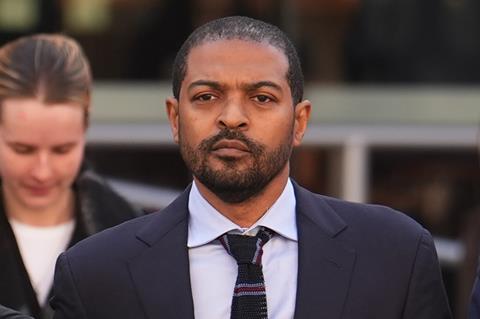
Noel Clarke contacted “at least 10 people” in efforts to halt the publication of The Guardian’s report of allegations of sexual misconduct, the court in his libel trial against the publication has heard today.
Paul Lewis, head of investigations at The Guardian, became the paper’s first staff member to take the stand in the trial, which began on March 7.
UK actor-director-producer Clarke is suing The Guardian’s publisher Guardian News and Media (GNM) over seven articles and a podcast, including an article in April 2021 that said 20 women who knew him professionally had come forward with allegations of misconduct.
Clarke denies the allegations, while GNM is defending its reporting as being both true and in the public interest.
Lewis said his team gave Clarke 24 hours’ notice to respond to the allegations before publication, which was then extended to 76 hours.
“We thought there was a risk that if Mr Clarke had an extended period of time, it would increase the possibility that some of these women would retract their allegations or be discouraged from speaking,” said Clarke at London’s High Court on Monday.
“They felt Mr Clarke had a reputation for being threatening, for using legal action against people who crossed him.”
In his witness statement, Lewis said his reporters Sirin Kale and Lucy Osborne were told that Clarke “had hired private investigators and had been pressuring women to stay silent.”
Lewis said in his statement that he believed Clarke and business partner Jason Maza at Unstoppable Film and Television had contacted “at least 10 people”, with some of the conversations leaving women “shaken, fearful and in tears”.
“I believed that, with more time, Mr Clarke and Mr Maza could succeed in persuading vulnerable women to withdraw their co-operation, perhaps by threatening them, and in doing so could potentially scupper the publication of any potential story holding him to account for his alleged behaviour,” said Lewis.
Philip Williams, representing Clarke, had previously said in written submissions that his client was “barely able to reply to the allegations” and that The Guardian’s 24-hour response window was “highly unreasonable”.
“These issues were issues that were within Mr Clarke’s direct line of knowledge,” replied Lewis. “It was also the case that with some allegations Mr Clarke was aware of them and he had been fighting them. It wasn’t going to arrive cold on his desk.”
Maza is not due to give evidence in the trial.
The hearing before Mrs Justice Steyn is due to conclude in April, with a decision expected in writing at a later date.







![The Brightest SunScreen[Courtesy HKIFF]](https://d1nslcd7m2225b.cloudfront.net/Pictures/274x183/3/5/0/1448350_thebrightestsunscreencourtesyhkiff_312678.jpg)

















No comments yet